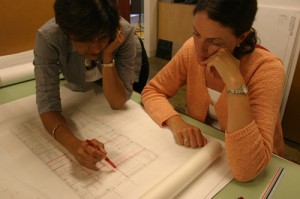The jury for the 2012 Virginia Society AIA Prize for Design Research and Scholarship met by conference call on Thursday, Sept. 6. Jury chair Brian Lee, FAIA, and jurors Phil Enquist, FAIA, and William Baker, PE, all with Skidmore Owings and Merrill, reviewed and discussed the nine entries, assessing them on originality, impact, purpose, methods, and conclusions. The jury unanimously selected “New Directions in Design Research: The Role of School Architecture in the Prevention of Childhood Obesity” as the 2012 Prize for Research and Scholarship. This paper was submitted by VMDO Architects in Charlottesville in collaboration with Terry Huang, Ph.D. and Matthew Trowbridge, M.D. The jury made these comments about the entry:
“Initially, the study title seemed naïve in linking architecture to the daunting societal problem of childhood obesity. However, the research presented a measured and well-documented series of facts and arguments corroborated by well-respected writers and thinkers. It contained insight into current education designs for the school physical environment that unwittingly reinforce unhealthy cultural habits and preferences. The project then focused on a specific design measures, large and small, to change the perceptions of and obstacles to healthy eating and cooking. The Jury was impressed that a series of discrete, often incremental, moves and ideas could potentially shift behavioral patterns and make a difference in our schools regarding children’s life choices. So often our design profession has taken a narrow rather than holist view of how buildings are experienced. Here, we are shown how food processed, presented, and integrated into the learning environment can make a daily difference to the child. In our discussion, it was this relevance and societal impact that lead us to select it as the winner of the Prize.”
The Jury was also impressed by a scholarly paper submitted by Elissa Rosenberg of the University of Virginia, “Gardens, Landscape, Nature: Duisburg-Nord, Germany,” evaluating a large scale urban garden by a contemporary landscape architect working toward a new spirit of sustainability. They wrote:
“This well-written critique clearly discussed a design methodology and work in a way that could have larger application of sensitive, adaptive reuse and a poetic ecology. The ideas seem fresh and original compared to the current repetition of mainstream sustainable design gestures. From the paper, the Jury thought the design was inspirational enough to be a place they wanted to visit. The submission was awarded a 2012 Honorable Mention.”
Jurors were very positive about the existence of a competition of this nature. They included these comments as part of their written response to the Prize entries:
“If the submissions were indicative of architectural interest in research, we can benefit from more dialogue between the academy and profession. There seems to be a lack of clarity and consistency towards research by our community involving building or environmental issues of today. Do we have a common research agenda that addresses the pressing topics that affect our world? Can we challenge ourselves to embark on research that is widely applicable or a game changer to today’s normality? Can the schools and profession collaboratively cultivate an ability to question our condition and use research to formulate creative and timely solutions that have impact and influence?”
The Prize will be awarded at Architecture Exchange East and the winner will present his work at seminar 207 at 10:45 a.m. on Thursday, Nov. 8. The Prize for Design Research and Scholarship is sponsored by MTFA Architecture.



